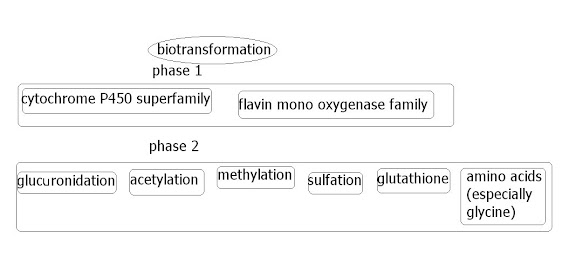Actions of ethnobotanically selected Cree anti-diabetic plants on human cytochrome P450 isoforms and flavin-containing monooxygenase 3
http://www.ncbi.nlm.nih.gov/pubmed/19665535
Regular readers will know that FMO3 enzyme is always of special interest to the blog. This is the latest pubmed paper about the enzyme, albeit only in a limited way.
The testers were testing the phase1 xenobiotic metabolizing enzymes to see how they are affected by natural medicines used by Cree Indians in Canada.Normally when researchers check reactions in phase 1 xenobiotic metabolizing enzymes, they only check the Cytochrome P450 super-family, even though the FMO family come into this category. This is probably because at the moment the FMO enzymes are perceived as unimportant. So it was good to see FMO3 tested in this test as well.
Probably the main reason for interest in these enzymes is that drugs are metabolized by them, and they can also have an inhibitive or inducing effect on the enzymes. Probably one priority to pharmaceutical industry testers is the thought of lawsuits. These enzymes have only been properly known about for about 50 years, and so a lot has still to be learnt about them, especially the FMO family. Presumably the tests were done 'in vitro' at a lab, rather than 'in vivo'.
The 'textbook' definition of FMO enzymes will say it can neither be induced or inhibited, even though those using the same definition have found a compound in cruciferous vegetables to be very inhibitive. In this study, FMO3 seemed to be 'middling' inhibited by the plant extracts used. However, it's not known how conclusive such studies can be, since often there are other conflicting papers published. Perhaps the 'behaviour' of a xenobiotic metabolizing enzyme isn't accepted until a definite trend in papers is seen.
Herbs and spices are of special interest in FMO3 because most are likely FMO3 'substrates' and also may have an inhibitive/inducing effect (currently unknown). This may explain why when taking herbs/spices/medicines, some may feel 'strange' and perhaps get pain around the liver (since the liver is the most prominent place where such enzymes are based).

concepts:
phase1 : modify a compound
phase2 : add a molecule to a compound; conjugate
These enzymes deal with internally produced compounds (neurotransmitters, hormones etc) as well as external compounds (from diet and environment etc)
The most abundant area for these enzymes is the liver, but they are everywhere.



























0 comments: